|
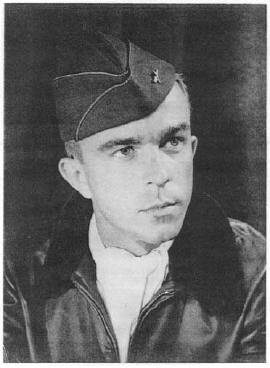 |
2nd Lt.
Charles Law Early
Pilot - B-17 No. 4239836
91st Bomb Group, 322nd Squadron, Aircraft LG-M
Stalag Luft I - Gefangenennummer 1704
Born
September 20, 1916 in Florence, South Carolina. |
On
December 1, 1943, Lt. Early, on his third mission, took off from
Bassingbourne, England on a mission to Germany. The crew of the
unnamed plane was:
2nd
Lt. Charles Law Early - pilot
2nd Lt. Billy G. Ponder - Co-pilot
2nd Lt. Roscoe E. Albright - Navigator
2nd Lt. Wilfred A. Bouchard - Bombardier
T/Sgt Paul E. Baker - Radio
S/Sgt Robert E. Bumb - Ball Turret Gunner
S/Sgt Carl H. McVey - Top Turret / Flight Engineer
Sgt. Tabor W. Best - Left Waist Gunner
Sgt. Marvin B. Britt - Right Waist Gunner
Sgt. Robert R. Holton - Rear Gunner
The following account is an excerpt from the Wartime Log kept by Lt. Early
during his internment at Stalag Luft I.
“My ship, a new B-17G, was on her first combat run on December 1, 1943. We
were on the way to bomb a steel mill near Solingen, Germany.
We crossed the Dutch coast at about 1200 hours, encountering no opposition.
One of my gunners, Sgt. Britt, was sick, but felt better after breathing
some pure oxygen, so we proceeded. We flew at about 28,000 feet, the
temperature was -50EC. we carried ½ our bomb-bay full of incendiary bombs,
the other ½ of high explosive. We encountered our first flak just south of
Cologne, immediately after crossing the German border. It was not accurate
at first, but climbed to our level as they found our range. We also ran
into a squadron of Focke-Wolf-190s. We were hit in the nose, the #2 engine
and the bomb-bay. Our engine caught fire, also the incendiary bombs began
burning, melting the aluminum cat-walk through the bomb-bay. The bombs
would not release. I gave the bail-out signal, and the crew left the ship.
I landed in a field between Aachen and Düren, injuring my foot. I was
unable to run, so hid under brush in a ditch, hoping to travel when night
fell.
I was captured about half an hour later by Hitler Jugend, who had spotted my
parachute descent.
[Records kept by the Tower Museum, Bassingbourne, England, indicate that
Sgt. Britt may have passed out from lack of oxygen as he was donning his
parachute. His body was discovered in the wreckage of the plane. The
co-pilot, Lt. Ponder, is believed to have been killed by civilians after
parachuting to the ground. The remainder of the crew survived.]
In the early morning of December 16, 1943, our train arrived at Barth. We
had traveled for three days in a converted cattle car - conversion in this
case consisting of the addition of wooden seats. The cars were unlighted
and, with the exception of inconveniently placed cracks, unventilated. Snow
was on the ground when we left Frankfort am Main, but the weather grew
steadily more damp and less cold as we approached the Baltic.
We were met at the station by guards from the camp, with the most efficient
group of police-dogs I have ever seen. After lining up in front of the cars
and having our noses counted, we set of on the trek to camp - walking.
Motor transportation in Germany seems non-existent. On the other hand, the
inevitable presence of horses on the road and the signs they leave behind,
led to some fancy footwork. We noticed that even the German officers walk
to and from the town - a distance from camp of something over two miles. My
leg and ankle were still giving me quite a bit of trouble, but managed to
clump along in a pair of flying boots.
Barth appeared to be a typical old world village - sadly in need of
cleaning. The church is quite ancient, and is rumored to be the parish
church of Martin Luther. It is a tremendous building, overtopping
everything in the town except the old town gate. The populace appeared
amused at us - some openly contemptuous - so we stalked through the streets
in our best martyr manner.
The camp itself was not too bad. We were taken first to take a hot shower
and delouse - our first bath since leaving England, a period of almost three
weeks. We were hoping to brush our teeth, but found that to be impossible,
as there were no toothbrushes. Indeed, it was two months before mine were
brushed.
We secured quarters in Block 3 - a washroom and latrine were both outside,
the latter consisting of a row of old fashioned holes, up which the wind
whistled so strongly that few were tempted to stay and philosophize. The
rooms were filthy, so we immediately set to with broom, and got it
presentable. It was impossible to keep clean though, as dirt literally
oozed up through the cracks in the floor. We heated and cooked on a tile
stove, which really did the job.
Camp strength was something over 300 men - British and American. It grew
steadily.”
Lt. Charlie Early was assigned to South Compound, Barrack 3. He was first
assigned to a 14 man room with:
Frank
W. Angevine - Brooklyn, New York
Don Marsh - Longmont, Colorado
H.R. “Dick” Ketchum - San Saba, Texas
Clint A. “Buck” Gruber - Portland, Oregon
Robert E. Reid - Richmond, Virginia
Carl Fyler - Hutchinson, Kansas
Charles J. Keating - Buffalo, New York
Everett B. Ragan - Geronimo, Oklahoma
Donald L. Strunk - Rochester, New York
D.E. Falk - Washington
Roscoe E. Albright, Coldwater, Michigan
Wilfred A. Bouchard
In
February, 1944, Lieutenants Early, Gruber, Reid and Ketchum moved to Block
3, Room 6 along with Capt. Robert S. Wilkins, Wilson, North Carolina, and
Capt. Roy E. Braly, Belmar, New Jersey. Eventually they added James J.
Kelly, Ellensburg, Washington, James McGahee, Texas and possibly Merle
Verberg, California.
Charlie remained in the service after the war. He married Margaret Byrd
Smith of Bamberg, South Carolina, on August 24, 1945. After a post-war
assignment to Lackland AFB in San Antonio, Texas, he attended the University
of Georgia, graduating in 1950, and received his MBA from the University of
Michigan in 1953. Upon receiving his degree, he was assigned to the 315th
Air Division in Tachikawa, Japan, remaining there until July 1956. He was
then stationed at Maxwell AFB, Montgomery, Alabama as an instructor at the
USAF Squadron Officer School, and rose to the rank of Lt. Colonel. He died
in Montgomery on March 19, 1961.
Present day survivors are his children,
Charles Law “Chuck” Early, Jr., of DeLand, Florida, also a pilot, recently
retired as a Colonel in the USAFR, and currently an attorney and a pilot for
Delta Airlines; Ruth Ann “Missy” Early Dorsett, of Tallahassee, Florida,
owner of a dental laboratory; and E. Gary Early, of Tallahassee, Florida, an
attorney; in addition to 5 grandchildren and 1 great-grandchild.
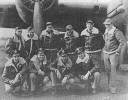
CREW PHOTO -
taken November 1943
Front
Row - left to right:
2nd Lt. Roscoe E. Albright - Navigator
2nd Lt. James R. Brown - co-pilot (not on final flight)
2nd Lt. Charles Law Early - pilot
2nd Lt. John Carter - Bombardier (not on final flight)
Back
row - left to right:
T/Sgt Paul E. Baker - Radio
S/Sgt Robert E. Bumb - Ball Turret Gunner
S/Sgt Carl H. McVey - Top Turret / Flight Engineer
Sgt. Tabor W. Best - Left Waist Gunner
Sgt. Marvin B. Britt - Right Waist Gunner
Sgt. Robert R. Holton - Rear Gunner
Lt. Brown and Lt. Carter were apparently shot down prior to December 1,
1943, as evidenced by a letter dated February 22, 1944, and received by Lt.
Early while at Stalag I. Both were interned at Stalag Luft III, Sagan,
Germany.
Drawings from his YMCA Log Book
|
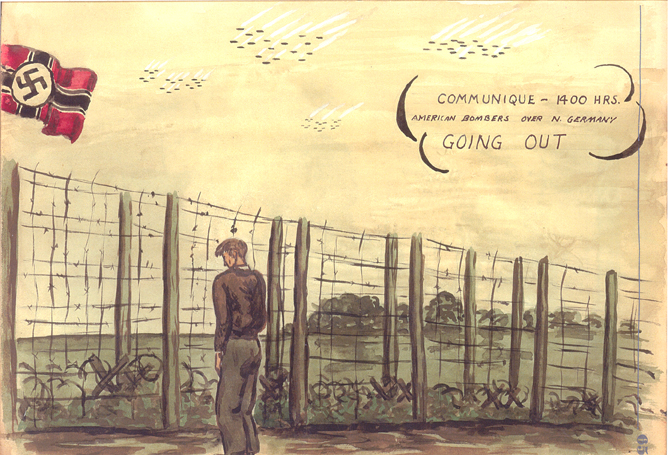 |
|
American Bombers over N. Germany |
|
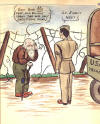 |
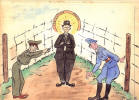 |
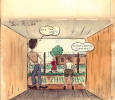 |
|
Rumor of War's End |
Protecting powers visit camp |
Girls on parade |
|
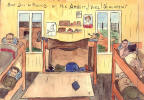 |
|
A busy day at POW camp
Per Clint Gruber - a roommate of Lt. Early:
Early drew himself on the left top bunk. On the
bottom is Bob Reid. Middle top is Roy Braly. Bottom bunk is Bob
Wilkins. Top bunk right, Dick Ketchum. And, completely sacked out (my
usual posture) in the bottom bunk, is myself. |
|
|
|
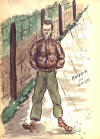 |
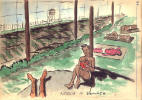 |
|
Kriegie in winter |
Kriegie in summer |
|
|
|
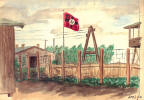 |
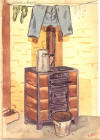 |
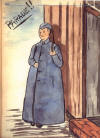 |
|
Stalag Luft I |
Kriegie stove |
Parade! |
|
|
|
|
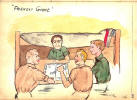 |
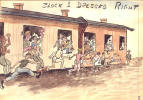 |
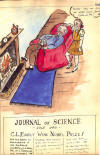 |
|
A Friendly Game |
Block 1 Dresses Right |
July 1990 Nobel Prize |
|
Diary of
Delivery
April 20th Adolph Hitler’s birthday. Am told by the
German that there has been great celebration among the populace.
Most flattering salute rendered by the Russians who laid down an
artillery barrage from 02:00 to 08:00, somewhere within hearing
distance of here – Stettin, most likely.
Later in the week. Russians have reached
Berlin, and are advancing into the city in their best steam roller
fashion. Hitler is reported to be in the front lines of the city’s
defense, so the fall of Berlin will probably bring the end of the
war.
Sat April 25th – Heavy artillery
fire from the south at 20:45, continuing at intervals through the
night. FW190s and ME109s at the airfield at Barth – tactical
airforce, so the front must not be very far away. We estimate 40-50
miles, from the sound of the firing.
Sunday April 29th – Short air raid
at 12;40. Guns sound louder. Saw our first Fieseler “Storch” –
reconnaissance aircraft, used as artillery spotter.
April 30th – This morning we stated
walking guard within the compound. I will have a squad as soon as
we take over. Col. Zemke came over and started the boys digging slit
trenches. Himmler is reported to have his headquarters just across
the bay, Goering with him. Hitler has died in Berlin. All the
planes are leaving the airport and demolitions have commenced.
German Intelligence Dept. has left Barth is being evacuated.
Russians reported 20 – 25 miles away, driving like mad! We can see
smoke from the field.
16:00 The Germans were blowing up the
installations at the Flak School by the South Compound, also this
factory west of there. The demolitions get louder and occur at more
frequent intervals. It gives one a rather queer feeling to watch
Germany blow to pieces before one’s eyes. Rumors are flying about,
so fast that I can’t keep up with them. Several Russian pilots were
shot down yesterday at Straslund and were brought to this camp. They
say that Joe will be here tonight. I shall not undress. All lights
went out at about 23:00 hrs.
May 1st – 17 months a prisoner
today. Very fitting that I should be awakened this morning at 05:00
by the fellows raising a hell of a racket. Look out the window and
there are American guards in the towers. It leaves me a little numb
– I just can’t believe it. Seems that the Germans stole silently
away last night under cover of darkness. So after all the talking
and planning we have finally taken over the camp. Now we wonder
when the Russians will arrive. Major Blum and Col Sluga came over
about 05:30 to wake us up and shoot the bull a bit – everybody very
excited! Wonder where the commandant and his staff went, and if
Himmler is still on the peninsula. Know that, in the future, when I
read this, I shall be appalled at its incoherency, but things have
happened so damned fast that my head is spinning “more than
somewhat”.
Now that it is practically over and I look back
on the whole period, I find that it has not seemed so terrible. Of
course, the month of the famine when we had no food & cigarettes,
was pretty grim, but usually we had enough food and with a wonderful
cook like Trubia we really ate quite well. Our bridge sessions with
Col Sluga and Major Blum have been a lot of fun, as have our crazy
discussions. I believe that I am a more mature, level-headed person
and far more fitted to tackle life in the future. Underneath all
this joy, however, lies a feeling of sadness as the thought that I
may never see again these fellows that I’ve lived with and scrapped
with for over a year. What a hell of a good bunch here in my room.
08:30 - Listening to British Broadcasting
Corporation on the barracks speakers. How wonderful it is to hear
English spoken instead of the old harsh German. Col. Zemke made a
short talk. We’re taking over the airfield today.
This afternoon we’re passing through a rather
low feeling – an anti-climax. All sorts of wild rumors have been
going around – Russians 3 kilometers away - Burgemeister commits
suicide.
10:20 or 22:20, as you like - A damned
historic moment. The Russians finally arrived!! The camp has gone
mad. The main body is reported to be four or five hours away.
German radio announced the death of Hitler – at long last. Listened
to BBC again – they played the Star Spangled Banner – my God, what a
moment. All the men came out of their rooms and stood at attention
in the hall, tears running down their faces, some of them sobbing.
More important goings on should take place
tomorrow – I’m dead!
Did I say as the Russians arrived? My God,
they took over the place. In order to keep us from roaming all over
the peninsula, the American Senior officers have locked the place up
tighter than it ever was. A mistake, I’m afraid. The fences were
torn down today on orders from a Russian who said he was a colonel –
he raised a hell of a row about us being locked up & brandished
his pistols more than somewhat. (He was later exposed as a
corporal.) We all went barreling across the fields to Barth to
see what the place looked like at close range. The Russians greeted
us wildly & wine actually flowed in the streets.
They have tanks drawn up in the square, have
taken all automobiles, horses, etc. & there is great activity. The
populace looks quite different than it did when we arrived here a
year and a half ago. There are reports of looting and rape by the
Russians, but rape seems a little on the order of wasted effort, as
the frauleins are most generous. The village people seem to be glad
that we’re here. After seeing the Russians!!!
We received reports that there is a small
concentration camp attached to the airdrome & plan to go over this
afternoon with the doctors. 
Visited the concentration camp, which will
forever remain in my memory as the most horrible sight I have ever
seen! The place was surrounded by electrically charged wire, and
inside were freshly dug graves which the inmates had prepared for
some of the more fragrant inmates. The filth in the living quarters
was indescribable. The floors and wall were covered with human
offal, & over the whole place hung a sickish sweet odor – an odor
which I have never before smelled, but which is instinctively
recognized as death. And indeed, the place was filled with death.
We went into rooms where all the inmates were dead – sitting up in
chairs, sprawled on their bunks, or crumpled on the floor – starved
to death. Not 1000 feet away was the post hospital, a beautiful
establishment with every modern medical aid – but it was denied to
these poor wretches. I talked with some of the Frenchmen who had
been here for years (found it very difficult to speak French without
lapsing into German every now & then). We brought the helpless ones
out and carried them to the hospital where they were bathed and put
into clean beds & treatment begun. Many of them are too far gone,
however, to save. The most shocking thing was the number of women
there.
May 10th The Russians have rounded
up the cattle of the area & have driven 150 Holstein cows into our
camp. We’re eating steaks! Ah, luxury. We still don’t
know when the Americans are coming for us. It’s been to day now
since we were freed, & still they haven’t come.
May 13th!! They’ve come. Started
arriving at 2:00 P.M. today. My old group, the 91st
Bombardment Group was the 1st to arrive. Have found that
I will leave tomorrow.
May 14th Rheims, France. At last it
has happened – I am out of Germany. We marched from Camp this
morning, through Barth, to the airdrome, & were flown here. We came
over the Ruhr. I don’t believe it! Huge cities like Essen,
Dusseldorf, etc, Can’t be so completely annihilated. It’s numbing.
We will go on from here tomorrow to a camp
called, of all things, Camp Lucky Strike, which is at St. Valery en
Caux, between Le Harve and Dieppe. We expect to ship from Le Harve
& go straight to New York – and then home!
That is all – over and out.
|
|
